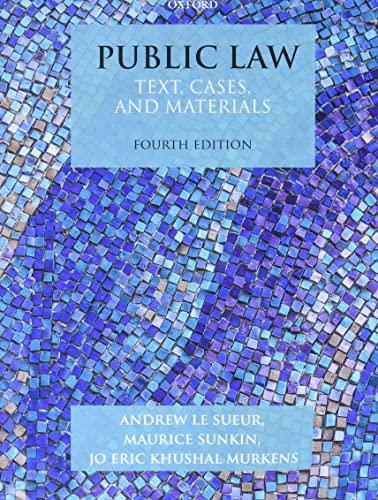Question
1. Gilbert Steel Ltd v University Construction Ltd The plaintiff contractually agreed to sell several shipments of steel to the defendant at a set price.
1. Gilbert Steel Ltd v University Construction Ltd The plaintiff contractually agreed to sell several shipments of steel to the defendant at a set price. After that agreement was partially fulfilled, the plaintiff's own supplier raised its prices. The plaintiff consequently persuaded the defendant to promise a higher price for the remaining shipments. The plaintiff delivered the rest of the steel, but the defendant refused to honour its promise to pay the extra amount. It argued that the plaintiff had already promised to deliver the steel under the initial contract and therefore did not provide anything in exchange for the later promise of the higher price. The court agreed. Since the plaintiff had not given anything new for the promise of extra payment, the defendant only had to pay the original price.
2. Central London Property Ltd v High Trees House Ltd [1947] The defendant leased an apartment block in London, England, from the plaintiff. The lease began in 1937 and was to run for 99 years, at a yearly charge of 2500. The defendant intended to rent out the individual apartments to other tenants. Unfortunately, once World War II began, the defendant could not rent out enough apartments to cover its obligations under the main lease. The plaintiff was sympathetic and therefore promised to reduce the rent to 1250 per year. That was a gratuitous promise because the defendant did not give any consideration in exchange for it. The parties proceeded on that basis for several years. By 1945, however, the war had ended and the building was fully occupied. The plaintiff then brought an action to determine (i) whether it could charge the original rent of 2500 in the future, and (ii) whether it could recover, as back rent, the amount that it had allowed the defendant to not pay during the war. The dispute was decided by Lord Denning MR. He held that while original rent could be reinstated in future years, the plaintiff was estopped from retracting its promise to charge only half rent during the war. In other words, for the past years, the plaintiff's promise was enforceable even though it was not supported by consideration.
Compare case 1 and 2 above. How can you distinguish case 2 from case 1? Why do the outcomes seem different?
Step by Step Solution
There are 3 Steps involved in it
Step: 1

Get Instant Access to Expert-Tailored Solutions
See step-by-step solutions with expert insights and AI powered tools for academic success
Step: 2

Step: 3

Ace Your Homework with AI
Get the answers you need in no time with our AI-driven, step-by-step assistance
Get Started


